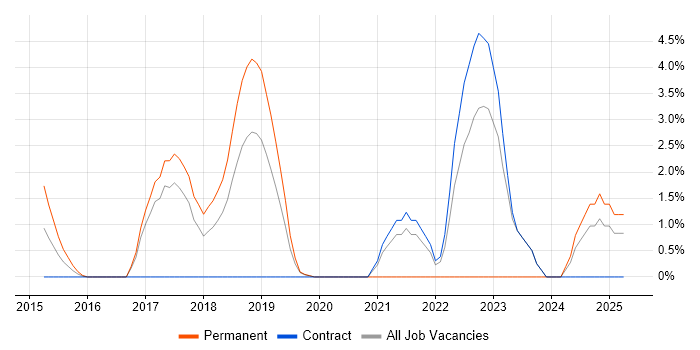Secure Code Development
Hertfordshire > Welwyn Garden City
The table below provides summary statistics for permanent job vacancies advertised in Welwyn Garden City requiring Secure Coding skills. It includes a benchmarking guide to the annual salaries offered in vacancies that cited Secure Coding over the 6 months leading up to 3 May 2025, comparing them to the same period in the previous two years.
| 6 months to 3 May 2025 |
Same period 2024 | Same period 2023 | |
|---|---|---|---|
| Rank | 6 | - | - |
| Rank change year-on-year | - | - | - |
| Permanent jobs citing Secure Coding | 1 | 0 | 0 |
| As % of all permanent jobs advertised in Welwyn Garden City | 8.33% | - | - |
| As % of the Processes & Methodologies category | 10.00% | - | - |
| Number of salaries quoted | 1 | 0 | 0 |
| Median annual salary (50th Percentile) | £55,000 | - | - |
| Hertfordshire median annual salary | £57,500 | - | - |
All Process and Methodology Skills
Welwyn Garden City
Secure Coding falls under the Processes and Methodologies category. For comparison with the information above, the following table provides summary statistics for all permanent job vacancies requiring process or methodology skills in Welwyn Garden City.
| Permanent vacancies with a requirement for process or methodology skills | 10 | 22 | 15 |
| As % of all permanent jobs advertised in Welwyn Garden City | 83.33% | 88.00% | 88.24% |
| Number of salaries quoted | 3 | 15 | 3 |
| 10th Percentile | £51,774 | £37,000 | - |
| 25th Percentile | £52,984 | £39,625 | £52,500 |
| Median annual salary (50th Percentile) | £55,000 | £47,500 | £55,000 |
| Median % change year-on-year | +15.79% | -13.64% | +3.29% |
| 75th Percentile | £65,500 | £51,750 | £57,500 |
| 90th Percentile | £71,800 | £56,900 | - |
| Hertfordshire median annual salary | £55,160 | £54,000 | £57,500 |
| % change year-on-year | +2.15% | -6.09% | +4.55% |
Secure Coding
Job Vacancy Trend in Welwyn Garden City
Job postings citing Secure Coding as a proportion of all IT jobs advertised in Welwyn Garden City.

Secure Coding
Co-occurring Skills and Capabilities in Welwyn Garden City by Category
The follow tables expand on the table above by listing co-occurrences grouped by category. The same employment type, locality and period is covered with up to 20 co-occurrences shown in each of the following categories:
